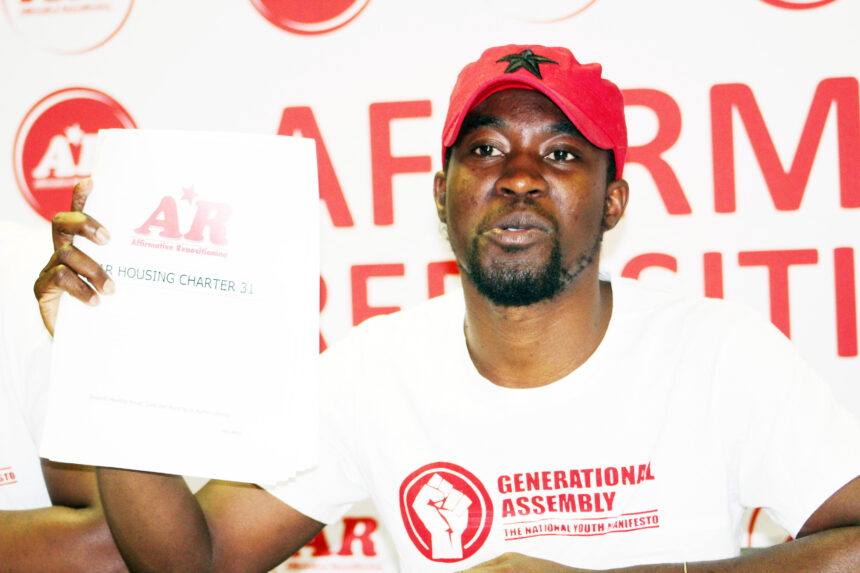The Affirmative Repositioning political party launched its ambitious plan in Katima Mulilo over the weekend “to rescue Namibia from collapse”.
Dubbed ‘AR Plan for Namibia’, the manifesto lays out their vision to liberate the country from the chains of hardship, should the electorate give them the mandate to govern on 27 November.
“Namibia is a rich country with poor people because of a corrupt leadership at Cabinet and parliamentary levels. To intervene and redirect our country, we need to vote for progressive change on 27 November 2024,” AR leader Job Amupanda says in the manifesto.
“Our game plan is unique, and has solutions that were never pronounced by anyone before. You only need to imagine how our country would be with this plan, and what would happen without it. In whatever we do, let us think of our children and our children’s children,” he stated.
Central to this, Amupanda said, is the need for decisive leadership in Namibia.
“When you study history – it can be that of Singapore or China – you realise that the leadership decided that ‘this problem gives us an opportunity to deal with the problems we are facing’. So, whatever you find or see as far as development is concerned, is that decisive leadership is always a determinant factor.
It’s not always the leadership that is supported by many people singing; it’s not the leadership that is supported by artists from South Africa; it’s not the leadership that is supported by the British; it’s not the leadership that wants to see themselves wearing suits and blue socks. It’s decisive leadership that can articulate and say, ‘This is the problem; this is the unfortunate situation that we need to turn into an opportunity for progress’.”
“Our approach as AR is: ‘What are the tragedies? What are those unfortunate circumstances? What are those things, like what happened to the Afrikaners when they were poor and uneducated?’ We are one of the most unequal societies in the world. We have one of the highest rates of unemployment in the world,” Amupanda said, adding that unemployment in Namibia could be much higher than what is revealed by official statistics.
This is why AR’s plan can work for Namibia, he said.
“Our plan is an attempt to turn tragedies, misfortunes and unfortunate situations into opportunities for progress,” the politician continued.
The party’s manifesto centres around four pillars – decisive leadership, an economic agenda, a legal agenda, and a social agenda.
Amupanda said his party’s plan for Namibia was produced by young people “without funds from other countries.”
“We don’t have money from elsewhere… and you can take our plan and test it against any plagiarism. We do things differently from within, and internalise them,” he said.
Promises
If elected to power, the AR also promises to make a raft of changes to Namibia’s social safety nets, as well as bring judicial reforms.
Chiefly, AR wants to introduce a childbirth grant for unemployed mothers for a period of one year, while also providing a full salary for mothers on maternity leave, which will be extended to six months.
The party likewise wants to implement a National Pension Fund, as well as free tertiary education up to the first university degree.
The party envisages to build two new universities over a period of 10 years, while reconstituting various youth institutions and creating a Youth Enterprise Fund.
On the sports front, AR promises to build two new national stadiums, while introducing National Health Insurance.
Furthermore, AR says it will double the number of referral hospitals from five to 10, the number of district hospitals from 31 to 62, and clinics from 322 to 644.
On housing, AR promised to clear the housing backlog, and convert the National Housing Enterprise into a full-blown housing bank, while also operationalising the Rent Control Boards in all urban areas.
Track record
Additionally, Amupanda said the party has already effected change for the betterment of society, even without being in office, despite its miniscule resources.
“From 2014, AR managed to achieve what many civil society organisations, organised formations and political formations had not been able to achieve. From getting the State President to agree and adopt a programme of action on land and housing, causing specific policy changes, and abandoning approved government positions and laws, the party has been able to record notable changes,” he emphasised.
He added: “Because of these achievements, more and more Namibians turned to AR for more assistance and action. It became evident that it is impossible for the movement to assist the masses of our people, at a massive, decisive scale, as an unstructured and uncodified formation. Therefore, the AR had to change the form.”



